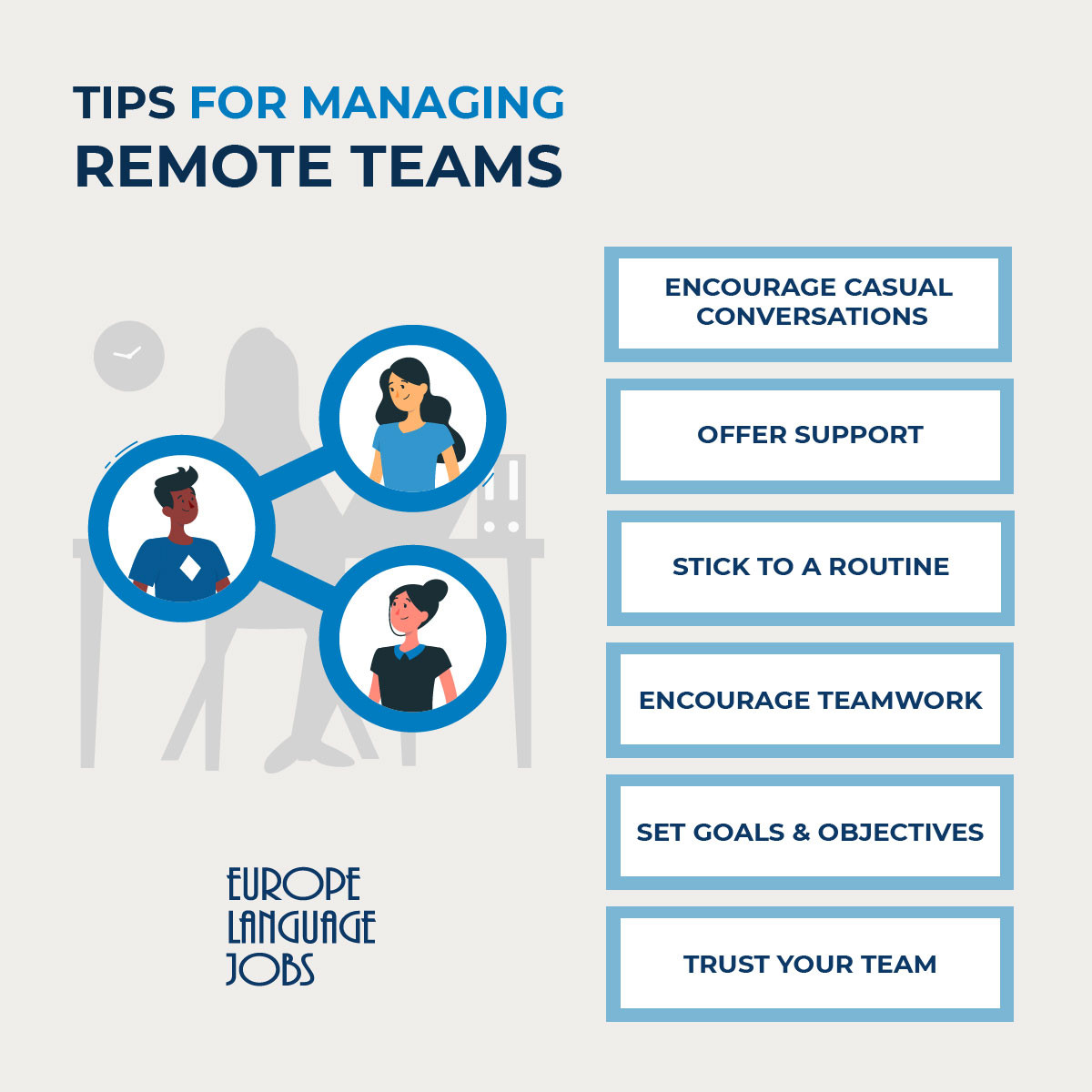Even before the outbreak of coronavirus, companies from all over the world were transitioning into remote teams due to just how effective and practical remote working is. It has always been particularly convenient for international companies, enabling companies to stay open through different timezones.
Globally, we are starting to see just how effective remote working is, as the world enters this global work-from-home experiment. Remote working may come easier to some of your employees than others, but as their manager, it’s important to introduce some key tips and tricks to ensure that your team stay happy and healthy.
At first, it may seem difficult to keep the level of motivation up, before you know it your team will be back to their normal selves again!
Keep your team happy and motivated with our 5 essential tips for managing remote teams - it’s easier than it seems!
- Encourage casual talk
- Offer continuous support
- Stick to a routine
- Encourage teamwork
- Set goals and objectives
- Trust your team

1. Encourage casual talk
You may have noticed already but remote working can get pretty lonely sometimes and that’s why one of the most important things you should do as a manager, is to encourage communication between your team throughout the day.
These conversations don’t always have to be work-related, they can also be a general check-up to see how everyone is doing, what your plans for the weekend are and general chit-chat.
By starting casual conversations via a web chat or group calls, you can encourage your team to open up about any problems that they may be having and any particular techniques and share any methods of work that are working for them.

2. Offer continuous support
This one goes without saying - always offer support to your employees. Whether you organise weekly one-to-ones via skype with your employees or you choose to schedule a phone call at the end of each day.
Scheduling conversations enables your employees to speak up about any problems they are having and reach out for any help. They may also be experiencing problems that are non-work related, so knowing that you as a manager, are there for them, will help significantly!
3. Stick to a routine
For the sake of your team’s productivity, it’s crucial to stick to a schedule to help your team stay motivated and to ensure that no one is over or underworking. By adopting a similar routine to a traditional office environment, your team will stay focused and productive working the same amount of hours that they usually do and taking regular breaks.
If you schedule meetings with your remote team, stick to them. Do your best to avoid cancelling any meetings, as this can disrupt the productivity of your team and can be somewhat demotivating. It's important for your team to know their importance and that you value their time as much as yours, so avoid asking them to finish projects after work or sending them messages during their breaks!
4. Encourage teamwork
Although your team will be working apart, it’s still important to encourage teamwork to help your team stay happy and engaged with one another. Just as you would in an office environment, you can schedule project discussions with your team and other interactive forms of communication through video calling and conferencing regularly.
It’s always nice to share ideas and to get the creative juices of your team flowing, encouraging continuous collaboration. But if you want to streamline communication and collaboration further, consider leveraging top intranet software providers to create a centralized hub for your remote team.
5. Set goals and objectives
When working remotely, an effective way of helping your team to work productively on their own is to encourage them to set goals and objectives. This helps them learn how to work well independently.
By setting realistic goals and objectives is a lot more effective than assigning mountains of tasks or even measuring their productivity through their activity. If you choose to monitor your team's productivity through their activity, this can lead to micromanagement and become extremely problematic.
Instead, you can start the week by setting goals and objectives for each employee to work through and review at the end of the working week. This will help you to measure your employee's performance more effectively.
6. Trust your team
Last but not least, trust your team. Although this whole work-from-home experiment may have occurred very abruptly for your team, the most important thing you can do is to support their growth through trust.
Give them space, trust their abilities and avoid micromanaging at all costs! Also, in order to promote a trustworthy relationship, you need to be honest and transparent with them in return.
If you have something that you would like to discuss with a member of your team, then do this carefully and properly. In any work environment, it’s always important to communicate properly with your employees to keep everyone in the loop and to maintain a good level of morale.
Whether this is a temporary measure or long-term, there are lots of effective ways to manage your team and maintain a good level of communication between them so that you can support their goals and their performance.
Especially when working remotely and not seeing one another every day, it’s important to help your team feel valued and secure and to keep the spirit of your teamwork alive.


















Kate Robinson1y ago
These are very useful tips, thanks. If you feel like reading more about how to manage a remote team, take a look at this article: https://kanbantool.com/blog/managing-a-remote-team-with-kanban-tool
These are very useful tips, thanks. If you feel like reading more about how to manage a remote team, take a look at this article: https://kanbantool.com/blog/managing-a-remote-team-with-kanban-tool